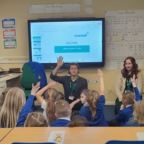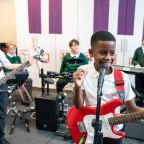
Children give green light to traffic light packaging idea
Could this be how we shop in the future? Children taking part in an experiment to see if ‘traffic light’ labelling on packaging made any difference to their purchasing habits said they would like to see the system introduced.
The idea is being advocated by international marine debris expert Professor Richard Thompson of Plymouth University, who believes that youngsters are the key to a reduction in the amount of plastics being used. Much of the plastic is only used once before being discarded and record amounts are ending up in the sea, with consequences for marine life.
In surveys carried out by the Marine Conservation Society during a weekend event last September, plastic bits and pieces made up almost 65% of all the litter found on British beaches, with some 1,300 plastic litter items found for each kilometre of beach surveyed.
In the traffic light labelling system, the green dot would be for packaging that uses recycled material, can be recycled and uses the minimum amount of material; a red dot would be displayed on packaging that does not use recycled content, is difficult to recycle and uses more material than it needs to; and an amber dot would be for material in-between.
Together with colleagues, Dr Sabine Pahl and Bonny Hartley from the university’s Psychology Department, Professor Thompson is surveying over 300 children at the Ecover Schools Blue Mile, an event which teaches youngsters about the marine environment. Eleven schools from Plymouth are taking part in the three-day event (June 17-19), which includes the shopping experiment at the National Marine Aquarium in Plymouth.
The initial signs are promising; on the first day of the schools event youngsters said they would take notice of red, amber and green labelling if it was used on packaging.
Emily Doble, a Year 7 student at Stoke Damerel Community College, said: “We’d like to have the coloured dots on packaging because then we would know and be able to choose. I would buy the ones with green dots because they don’t have such a terrible impact on the environment and the animals.”
The ‘shop’ is run by Plymouth University students, who say the youngsters were making choices based on the labelling: “They’re noticing the difference between the types of plastic and they’re changing their shopping by swapping items. And they’re buying fruit that is loose and not in packaging. They’ve also learned that some of the things they buy regularly, such as shower gels, contain micro-plastics.”
Some innovations have already started within the industry. Ecover, the world’s largest producer of ecological cleaning products, has created PolyEthylene (PE) – a ‘green’ plastic called Plant-astic that is 100% renewable, reusable and recyclable – and made from sugarcane.
The children at the Ecover Schools Blue Mile are taking part in Professor Thompson’s before and after survey, which aims to see if their perceptions of litter change as a result of what they have learned at the event. He says the youngsters have a huge role to play – not just because they are the consumers of the future, but because they can influence their parents now.
Plastics account for a staggering 75% of all rubbish found in our seas – and some of it ends up killing wildlife. A recent report by Prof Thompson found that 663 species have to date been affected by marine debris – 80% of which was plastics. The number of species affected is rising all the time. Many of the creatures had suffered entanglement or ingestion and among the most badly hit were turtles, seals and whales.
Beau Le Bredonchel, Outreach Specialist at Plymouth University, said: “If these youngsters don’t understand what is happening to the seas then it will only get worse. This is the generation that will make the difference. Without change, we’ll have no fish or marine life in the seas.”















